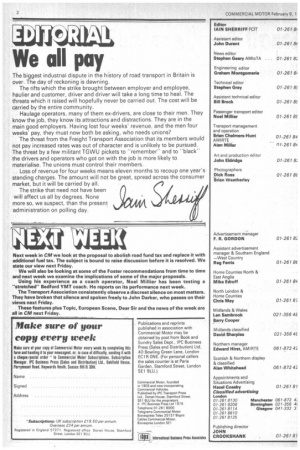We all pay
Page 4

If you've noticed an error in this article please click here to report it so we can fix it.
The biggest industrial dispute in the history of road transport in Britain is over. The day of reckoning is dawning.
The rifts which the strike brought between employer and employee, haulier and customer, driver and driver will take a long time to heal. The threats which it raised will hopefully never be carried out. The cost will be carried by the entire community.
Haulage operators, many of them ex-drivers, are close to their men. They know the job, they know its attractions and distractions. They are in the main good employers. Having lost four weeks' revenue, and the men four weeks' pay, they must now both be asking, who needs unions?
The threat from the Freight Transport Association that its members would not pay increased rates was out of character and is unlikely to be pursued. The threat by a few militant TGWU pickets to "remember" and to "black" the drivers and operators who got on with the job is more likely to materialise. The unions must control their members.
Loss of revenue for four weeks means eleven months to recoup one year's• standing charges. The amount will not be great, spread across the consumer market, but it will be carried by all.
The strike that need not have been will affect us all by degrees. None more so, we suspect, than the present administration on polling day.




































































































